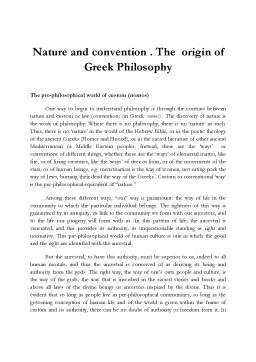Extras din referat
The pre-philosophical world of custom (nomos)
One way to begin to understand philosophy is through the contrast between nature and custom or law (convention) (in Greek: nomos). The discovery of nature is the work of philosophy. Where there is no philosophy, there is no ‘nature’ as such. Thus, there is no ‘nature’ in the world of the Hebrew Bible, or in the poetic theology of the ancient Greeks (Homer and Hesiod), or in the sacred literature of other ancient Mediterranean or Middle Eastern peoples. Instead, there are the ‘ways’ or conventions of different things, whether these are the ‘ways’ of elemental matter, like fire, or of living creatures, like the ‘ways’ of deer or lions, or of the movements of the stars, or of human beings, e.g. menstruation is the way of women, not eating pork the way of Jews, burning their dead the way of the Greeks.. Custom or conventional ‘way’ is the pre-philosophical equivalent of “nature.”
Among these different ways, “our” way is paramount: the way of life in the community to which the particular individual belongs. The rightness of this way is guaranteed by its antiquity, its link to the community we form with our ancestors, and to the life our progeny will form with us. In this pattern of life, the ancestral is venerated, and this provides its authority, its unquestionable standing as right and normative. This pre-philosophical world of human culture is one in which the good and the right are identified with the ancestral.
But the ancestral, to have this authority, must be superior to us, indeed to all human mortals, and thus the ancestral is conceived of as deriving its being and authority from the gods. The right way, the way of one’s own people and culture, is the way of the gods, the way that is inscribed in the sacred stories and books and above all laws of the divine beings or ancestors inspired by the divine. Thus it is evident that so long as people live in pre-philosophical communities, so long as the governing conception of human life and of the world is given within the frame of custom and its authority, there can be no doubt of authority or freedom from it. In such a community, governed by divine laws, it is forbidden to subject these laws to genuine discussion and critical examination. In such a community, there is no ‘cognitive elbow room’ for an ‘I’ to emerge that can oppose the ‘We’ without guilt. In such a community, the concept of doubt or criticism is impious, if not intellectually impossible, since the conceptual tools for articulating such doubt do not exist.
The emergence of philosophy with the idea of nature (physis)
The emergence of both science and philosophy is coeval with the discovery of the idea of nature. This discovery is credited to a particular Greek thinker, Thales of Miletus, around 600 BC, but it is worthwhile considering the conditions in his own society that would have made this intellectual discovery possible. For one thing, he lived in a port city and among a sea-fairing people—the ancient Greeks—who were in close proximity to many other peoples, languages and customs, with different moral and legal codes, different conceptions of the world, and different gods. The simple fact of contrary and contradicting sacred stories opened the possibility of questioning which of these stories were true. In Homer’s Odyssey, Thales would have known a literary hero of great distinction, Odysseus, who was himself not only many-traveled—observing differences among peoples (albeit within the frame of the archaic Greek gods and their ways)—but also himself a teller of tales, including tales of mythological creatures and of a journey to Hades, the land of the dead. Were his stories true? Were those of the bard? Was it not necessary, even in relation to the sacred things, to distinguish what one could know with one’s own eyes, as opposed to what was transmitted by hearsay?
Preview document
Conținut arhivă zip
- Nature and Convention.docx


















